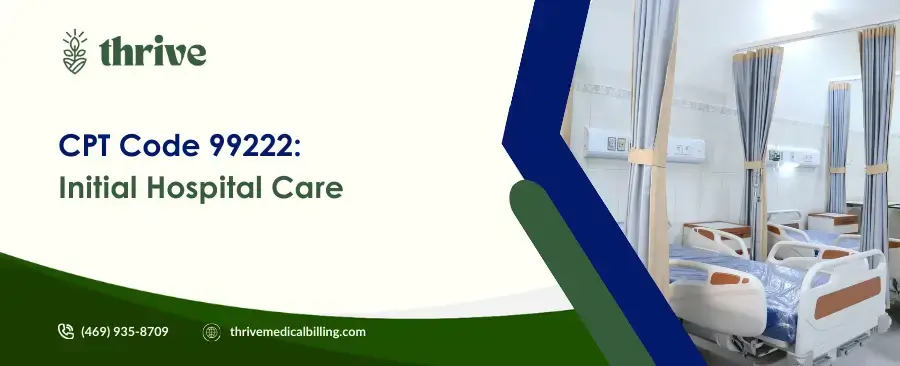Introduction to 99222 CPT Code Description
CPT code 99222 is a procedural code used in medical billing to describe an evaluation and management (E/M) service for initial hospital care of an inpatient or observation patient, typically requiring a moderate level of medical decision-making or 50–69 minutes of total time spent on the date of the encounter. This code is part of the Current Procedural Terminology (CPT) system maintained by the American Medical Association (AMA) and is commonly used in hospital inpatient settings by physicians and qualified healthcare professionals. Understanding the 99222 CPT code description is essential for healthcare providers and billing professionals to ensure accurate billing and avoid issues that lead to claim denials.
This guide provides a detailed overview of CPT code 99222, its applications, modifiers, Medicare reimbursement rates, and strategies to optimize billing for initial hospital care services addressing various medical conditions.
What is CPT Code 99222 and Initial Hospital Care?
CPT code 99222 represents an initial hospital care evaluation and management (E/M) service provided to a patient upon admission to a hospital inpatient or observation status. It is used for the first encounter by the admitting physician or qualified healthcare professional (e.g., hospitalist, nurse practitioner) and involves:
- A moderate level of medical decision-making (MDM), based on the complexity of the problem(s) addressed, data reviewed, and risk of complications or morbidity.
- OR 50–69 minutes of total time spent on the date of the encounter, including face-to-face and non-face-to-face activities (e.g., reviewing records, coordinating care, or documenting).
This code is used in hospital inpatient or observation settings to establish a patient’s care plan during admission, typically for conditions requiring moderate clinical effort. CPT code 99222 is commonly billed by specialties like internal medicine, cardiology, or hospitalist services for patients with moderately complex conditions.
Procedure Involving CPT Code 99222
The procedure involving CPT code 99222 includes the following components, as defined by the AMA’s E/M guidelines:
- Comprehensive History: The physician collects a detailed or comprehensive history, including the patient’s chief complaint, history of present illness, past medical history, social history, family history, and a review of systems.
- Comprehensive Physical Examination: A detailed or comprehensive examination of multiple body areas or organ systems is performed to assess the patient’s condition upon admission.
- Medical Decision-Making (MDM): The physician evaluates the patient’s condition, reviews relevant data (e.g., labs, imaging, prior records), and develops a care plan. For 99222, MDM is typically moderate, involving multiple diagnoses, moderate data complexity, or moderate risk of complications.
- Time-Based Billing (Optional): If time is used instead of MDM, the physician spends 50–69 minutes on the encounter, including activities like reviewing charts, consulting with other providers, ordering tests, or documenting in the medical record.
- Documentation: The physician documents the history, exam findings, MDM, or time spent to support the level of service billed.
The procedure occurs in a hospital inpatient or observation setting, such as a hospital ward, intensive care unit, or observation unit. CPT code 99222 is used for the initial encounter on admission, distinguishing it from subsequent hospital care codes.
Comparison with Related CPT Codes
CPT code 99222 is part of the E/M code set for initial hospital care, which varies based on the level of service and complexity. Here’s how it compares to related codes:
- CPT Code 99221: Represents an initial hospital care visit with low MDM or 30–49 minutes of total time, used for less complex conditions.
- CPT Code 99223: Covers an initial hospital care visit with high MDM or 70–89 minutes of total time, used for complex or severe conditions.
- CPT Code 99231–99233: Describes subsequent hospital care visits, unlike 99222 which is for the initial encounter.
- CPT Code 99238–99239: Represents hospital discharge services, distinct from initial care coded by 99222.
- CPT Code 99214: Covers an outpatient E/M visit for an established patient, not applicable to inpatient settings like 99222.
Choosing the correct procedural code is critical to ensure accurate billing. For example, billing CPT code 99222 for a subsequent visit (99232) or an outpatient visit (99214) can lead 9to claim denials.
Modifiers for CPT Code 99222
Modifiers provide additional context for CPT code 99222 to ensure proper reimbursement. The following modifiers are sourced from the AMA’s CPT Professional Edition and CMS’s National Correct Coding Initiative (NCCI) Policy Manual:
- Modifier 24 (Unrelated E/M Service During Postoperative Period): Indicates an E/M service unrelated to a prior procedure’s postoperative period, as per AMA guidelines.
- Modifier 25 (Significant, Separately Identifiable E/M Service): Used when a separate procedure (e.g., minor bedside procedure) is performed on the same day as the 99222 visit, per CMS’s NCCI edits.
- Modifier 57 (Decision for Surgery): Applied when the 99222 visit results in a decision for major surgery, as outlined in AMA standards.
- Modifier 99 (Multiple Modifiers): Used when multiple modifiers are needed, per AMA guidelines.
- Modifier AI (Principal Physician of Record): Used by the admitting physician to identify their role in coordinating inpatient care, particularly for Medicare claims, as per CMS’s Medicare Claims Processing Manual.
Providers must adhere to AMA and payer guidelines, including Medicare’s NCCI edits, to avoid errors that lead to claim denials. Note that Modifier 95 (Synchronous Telemedicine Service) is not typically applicable to 99222, as it is primarily an inpatient code, though telehealth policies may vary by payer.
Medicare Reimbursement Rates for CPT Code 99222
CPT code 99222 is reimbursable by Medicare, but reimbursement rates vary based on several factors:
- Medicare Physician Fee Schedule (MPFS): The MPFS provides payment rates for CPT code 99222, adjusted by the Geographic Practice Cost Index (GPCI) for regional cost differences, as outlined by CMS.
- Medicare Administrative Contractors (MACs): Regional MACs may impose specific billing rules or coverage criteria, such as Local Coverage Determinations (LCDs) for E/M services.
- Facility Rates: CPT code 99222 is typically billed in facility settings (e.g., hospitals), where reimbursement reflects professional services only, as facility costs are covered separately (e.g., via DRG payments).
- Documentation Requirements: Medicare requires detailed documentation to support moderate MDM or time spent, per CMS’s Medicare Claims Processing Manual.
To verify reimbursement rates for 2025, providers should:
- Check the MPFS on the Centers for Medicare & Medicaid Services (CMS) website.
- Consult their regional MAC for specific coverage policies and billing rules.
- Use coding tools like AAPC Coder or Kareo for rate estimates.
Accurate documentation of medical necessity, such as managing multiple chronic conditions or addressing acute inpatient issues, is critical for Medicare reimbursement.
Conditions Addressed with CPT Code 99222
CPT code 99222 is used to address a wide range of medical conditions during initial hospital care for inpatients or observation patients, requiring moderate complexity. Examples include:
- Chronic Conditions: Establishing care plans for conditions like congestive heart failure, chronic obstructive pulmonary disease (COPD), diabetes mellitus, or chronic kidney disease upon admission.
- Acute Conditions: Managing inpatient issues like pneumonia, acute kidney injury, gastrointestinal bleeding, or decompensated heart failure.
- Post-Surgical Admissions: Initiating care for patients admitted after procedures like appendectomy or joint replacement, addressing complications or pain management.
- Complex Symptom Evaluation: Assessing symptoms like chest pain, shortness of breath, or altered mental status requiring moderate diagnostic workup.
- Coordination of Care: Managing multidisciplinary care for conditions like sepsis, stroke, or cancer during hospital admission.
The moderate complexity of CPT code 99222 makes it suitable for inpatient encounters involving multiple diagnoses or detailed clinical decision-making in hospitalist or specialty care.
Medical Billing Best Practices to Ensure Accurate Billing
To ensure accurate billing for CPT code 99222 and minimize issues that lead to claim denials, providers should adopt the following medical billing strategies:
- Train Staff: Educate billing staff on the 99222 CPT code description, its differences from other E/M codes (99221, 99223, 99232), and appropriate modifiers, using resources like the AMA’s CPT Professional Edition.
- Use EHR Systems: Electronic health records like Epic, Cerner, or Meditech streamline documentation and coding for initial hospital care.
- Document Medical Necessity: Clearly note the comprehensive history, exam findings, MDM, or time spent to justify the moderate complexity of 99222, aligning with AMA and CMS guidelines.
- Verify Payer Guidelines: Confirm Medicare and private payer rules for CPT code 99222, especially regarding frequency, modifier use, and documentation requirements.
- Conduct Regular Audits: Review claims to ensure compliance with E/M guidelines and identify errors, using tools like AAPC Coder or internal audit processes.
These practices optimize revenue cycle management and improve financial outcomes for hospitalist and inpatient care practices.
Common Errors That Lead to Claim Denials
Billing errors for CPT code 99222 can lead to claim denials, delaying reimbursement. Common mistakes include:
- Incorrect Code Selection: Billing CPT code 99222 for a low-complexity admission (99221), high-complexity admission (99223), or subsequent visit (99232).
- Improper Modifier Use: Applying Modifier 25 without a separate, significant procedure or omitting Modifier AI for Medicare claims when required, per CMS’s NCCI Policy Manual.
- Inadequate Documentation: Failing to document the comprehensive history, exam, MDM, or time required to support 99222, leading to downcoding or denials.
- Unbundling Errors: Billing CPT code 99222 with other E/M codes or procedures without justification, violating NCCI edits.
- Non-Compliance with Payer Policies: Not adhering to Medicare or private payer rules for medical necessity or frequency of initial hospital care visits.
Providers should verify codes, modifiers, and documentation to ensure accurate billing and avoid denials, aligning with AMA and CMS standards.
Conclusion and Resources
CPT code 99222 is a critical procedural code for initial hospital care evaluation and management services, addressing moderately complex conditions in hospital inpatient or observation settings, such as chronic diseases, acute illnesses, or post-surgical care. By understanding the 99222 CPT code description, its modifiers, Medicare reimbursement rates, and best practices for medical billing, providers can ensure accurate billing and minimize issues that lead to claim denials. For further guidance, consult:
- CMS Website: For MPFS, NCCI edits, and reimbursement rates.
- American Medical Association (AMA): For CPT code updates and E/M guidelines.
- Society of Hospital Medicine (SHM): For resources on hospitalist care and initial hospital care coding.
By staying informed and proactive, healthcare providers can optimize billing for CPT code 99222 and enhance patient care through effective inpatient management.








